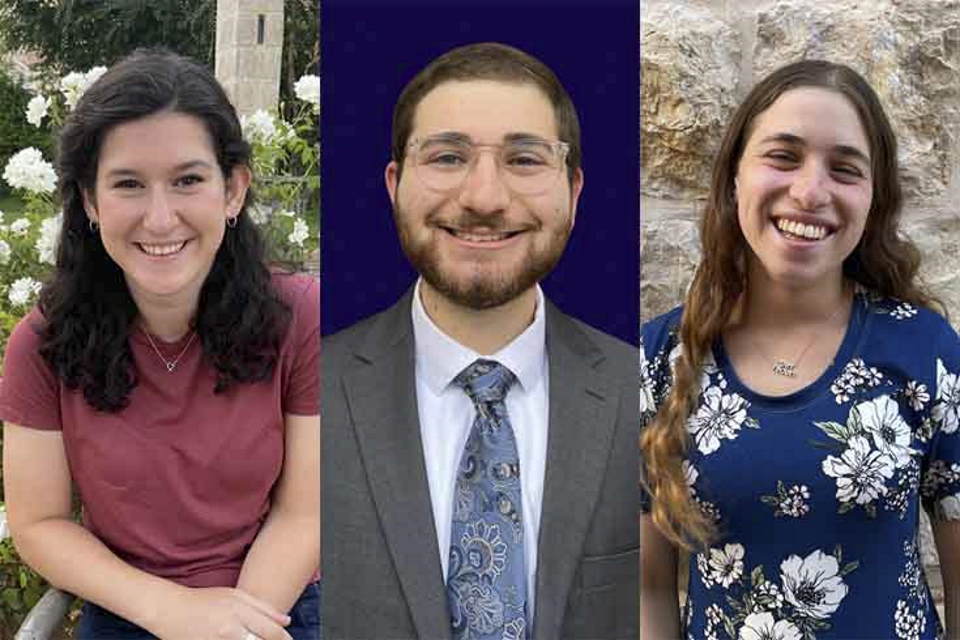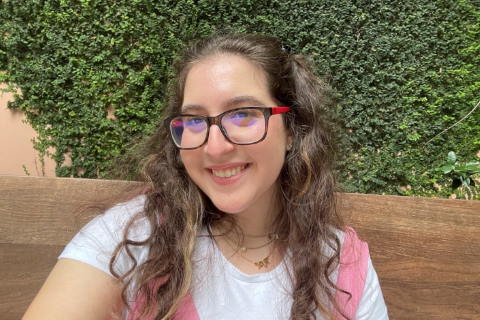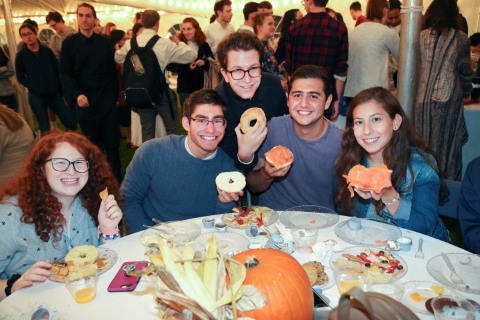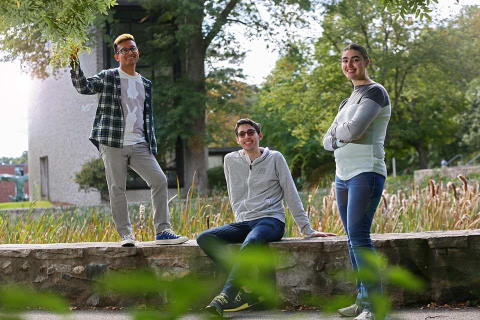How a Trip to Israel Changes You

From left to right: Maya Levisohn, Nathan Ashner and Aviva Weinstein
Feb. 14, 2022
By Penny Schwartz, P'13
Visiting Israel changes you.
Whether it's a reevaluation of your Jewish identity, observing the Israeli-Palestinian conflict up close, learning about the country's past or just hanging out with the locals at the beach, some kind of transformation of your worldview invariably occurs.
As University Professor Jonathan Sarna '75, GSAS MA'75, puts it, "There's always a kind of magic that comes from spending an extended time in Israel."
Over the last two years, six undergraduates got to spend several months in Israel pursuing career or academic interests with the aid of Frances Taylor Eizenstat '65 Israel Travel Grants, which are administered through the Schusterman Center for Israel Studies.
Stuart Eizenstat, a leading international trade lawyer and diplomat currently serving as the special adviser on Holocaust issues to the U.S. Secretary of State, started the program in 2013 in honor of his late wife Frances, who was transformed by the year she spent in Israel as a junior at Brandeis.
"Her identity with Israel was strengthened and solidified into, not only her own lifelong attachment to Israel, but one that was transmitted to our family,” Eizenstat said at a recent Schusterman Center panel on the travel grant program.
TJE asked three Eizenstat grant recipients for first-person accounts of their time in Israel last summer.
Nathan Ashner '22
Interned at Tazpit Press Service (TPS), a nonprofit English-language news agency based in Jerusalem.
Working, studying and living in Israel gave me a more nuanced understanding of the Israeli-Palestinian conflict and put a human face on its impact.
Throughout the summer, there were incidents of increased tensions between Gaza and Israel. Explosive-laden balloons launched from Gaza that caused forest fires and property damage were followed by sometimes harsh retaliatory military action from the Israeli Defense Forces to deter future attacks.
I came to understand the context and complexities involved and saw that no single action can be viewed as an isolated incident, which is different from how it may seem on the news in America. Based on my experience, I am eager to pursue a career in journalism.
Living in East Jerusalem across the street from the border with the West Bank gave me a picture of what it means to live in contested territory.
I saw up-close people living on both sides of the border and Palestinians crossing over every day to get to work. While there were terrorist attacks throughout the summer, many people were carrying on their daily lives.
Walking around, I discovered amazing Hebrew graffiti art. I was drawn to one work with the biblical phrase from Leviticus, "V'ahavta L'rey'echa Kamokha" ("Love thy neighbor as thyself.") The words were painted in huge black Hebrew letters on the side of a wall. It’s unique to be in Israel and see Hebrew graffiti with a Jewish biblical reference. It was in these kinds of moments where I experienced Hebrew as a living language, rather than purely a liturgical one.
Aviva Weinstein '23
Interned, Ethiopian National Project, a nonprofit organization in Jerusalem that helps Ethiopian Jews integrate into Israeli society.
Although I was already aware of the presence of Ethiopian Jews in Israeli society today and knew that many Ethiopian Jews are religious, observe Shabbat and keep kosher, it was eye-opening to discover that despite our language and cultural differences, we share so many of the same traditions.
One challenge faced by this community, known as Beta Israel, is that some religious Israeli Jews and rabbis don’t accept that Ethiopians can be Jewish, simply because they are Black. There are even some rabbis who won’t perform Ethiopian Jewish weddings.
It was disturbing and frustrating, especially after doing extensive research on the history of the Ethiopian Jewish people and realizing that they uphold many of the same religious practices as Jews around the world.
It was hard to fathom that people could be so unaccepting of these people as Jews in Israel.
Israel has always been a place where I feel at home, so it was sad to see others being treated this way mainly due to the color of their skin.
Fortunately, others were more welcoming, and it felt inspiring for me to be a part of such a wonderful organization working to make a change for this community.
I was especially touched to meet newly arrived Ethiopian students at an after-school program in the south of Israel. One girl, who had only been in Israel for six months, told me that she dreams of being an astronaut in the future
Maya Levisohn '23
Interned at the Jerusalem office of Gigawatt Global, a multinational renewable energy company.
I wrote and compiled environmental and social impact reports for large-scale solar projects in Africa. I saw just how many sectors of society are affected by solar development as well as how careful Gigawatt is about the impact of their actions.
Many countries lack the needed electrical infrastructure. Some communities struggle with consistent energy access but care deeply about their environment and don’t want to disrupt their beautiful natural landscape. Navigating these issues and searching for solutions were key to ensuring that we developed efficient solar fields in the best way possible.
On the fun side, I was part of a Hebrew University lab study about tourism in Jerusalem’s Old City. As I walked around popular sites, I wore monitors that measured my heart rate and sensors on my finger along with glasses with 11 different cameras that tracked my eye movements.
I self-reported my feelings at each location so that they could be compared with the physical measurements. While it was very different technology from my Gigawatt's, it was another example of the dedication to science and exploration one can find in so many places across Israel.
The application deadline for the Eizenstat Israel Travel Grant is March 1. Apply on the Schusterman Center website.



